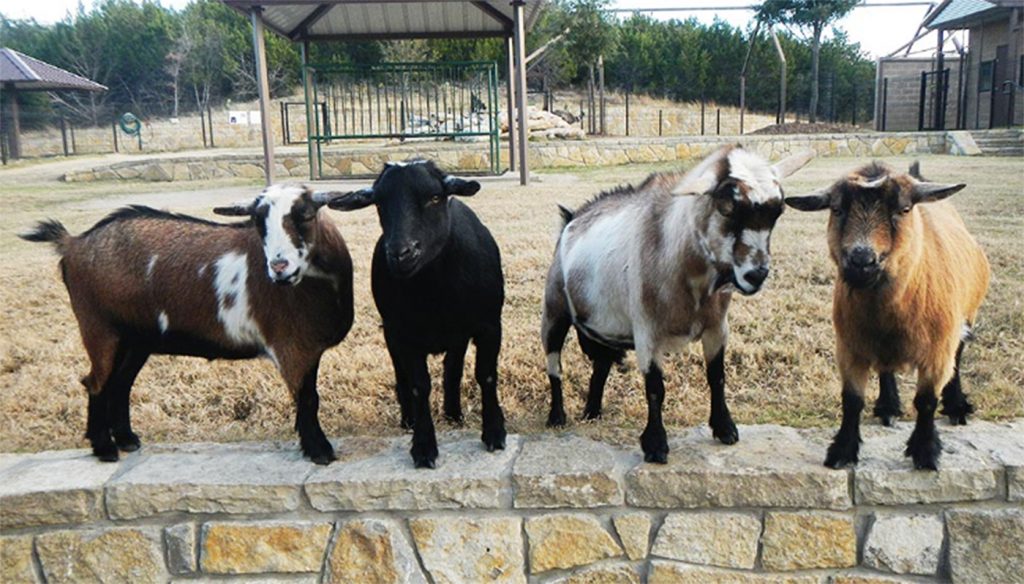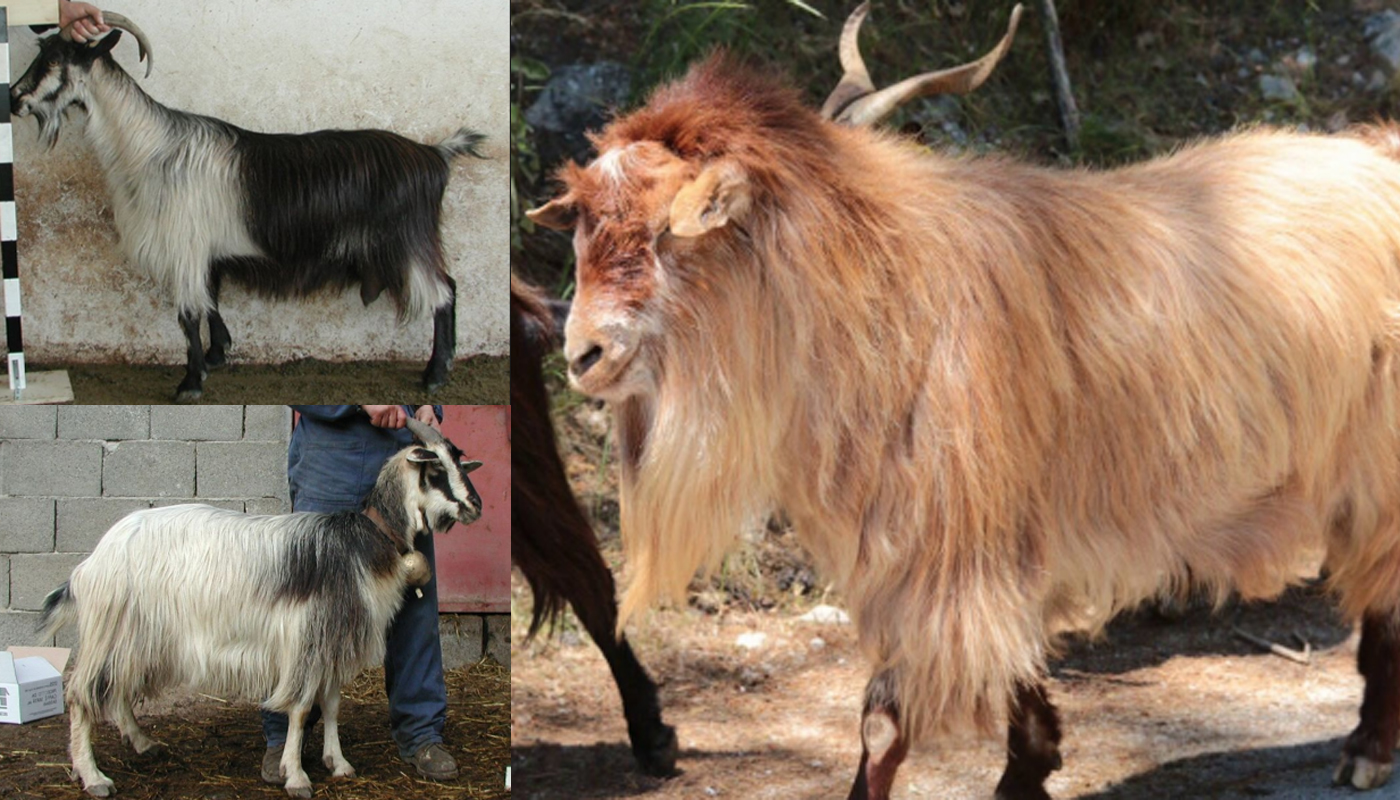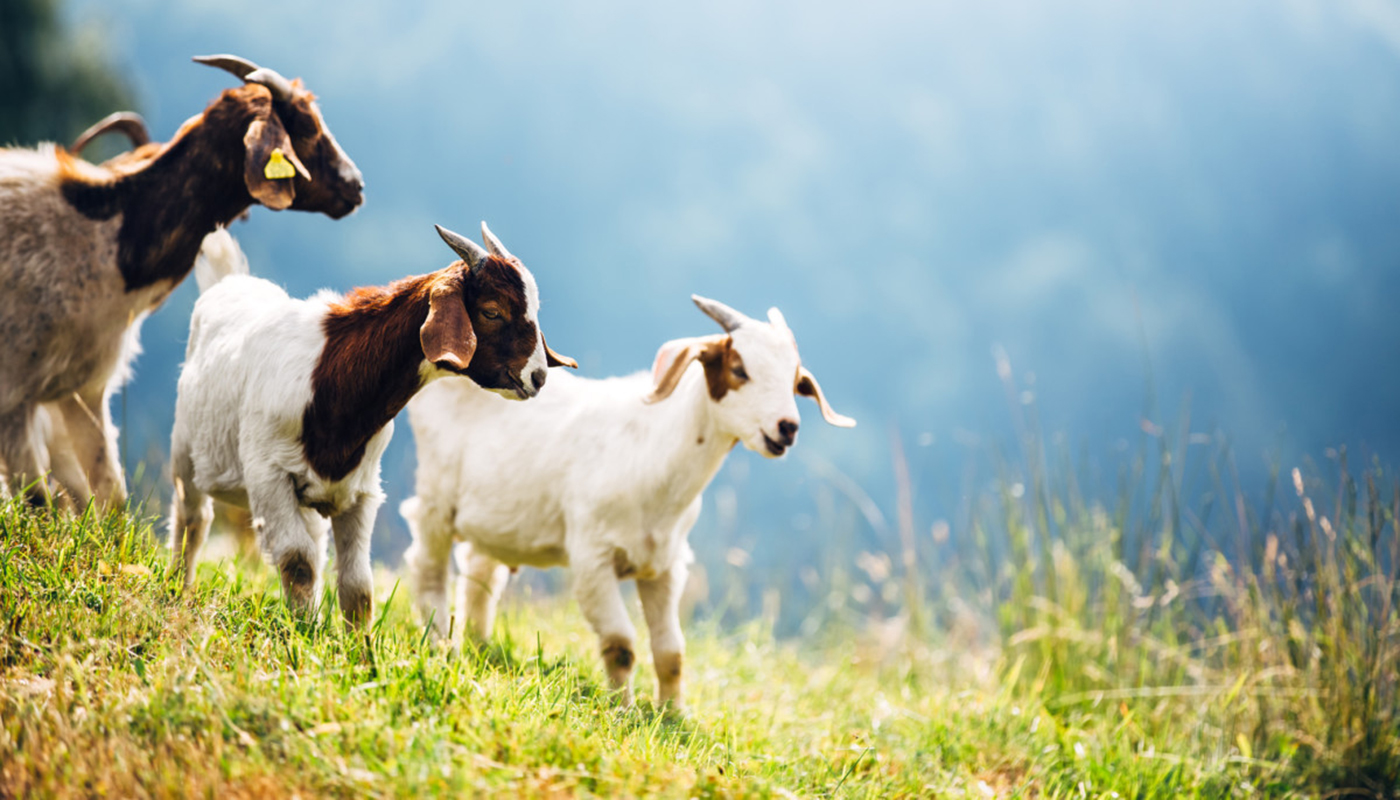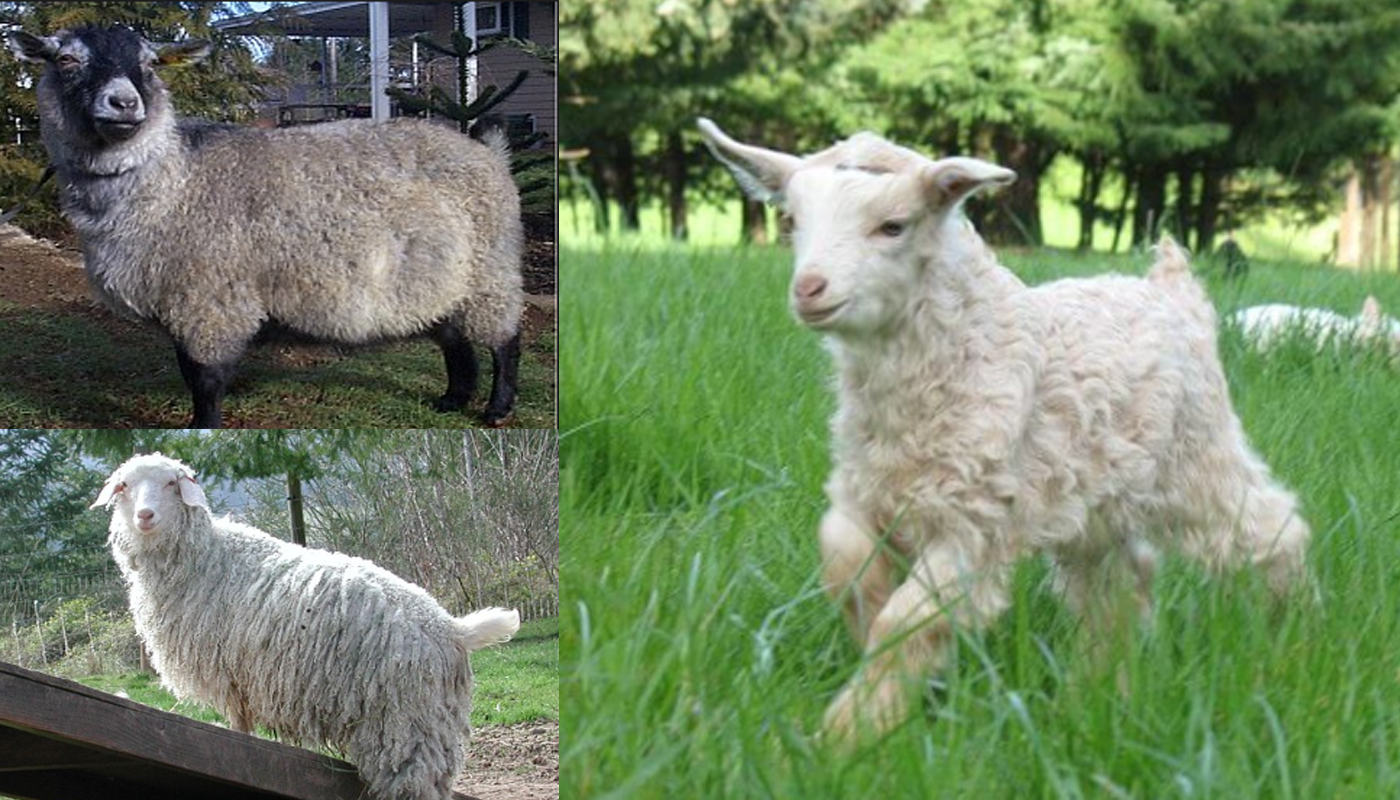
These little goats make the best pets and if town ordinances and neighborhood policies allow for it they can quite comfortably be kept as backyard pets. Plus, they are small little dairy goats as well. Their milk is sweet and depending on the lactation phase of the goat can contain butter-fat content of between 5% to 10%. This makes her butterfat content higher than most other full-sized dairy goats.
Their friendly and calm nature make them excellent around children and most owners report that they become part of the family. Some say they are just like their children too always getting up to something, climbing and letting their insatiable curiosity get them into all kinds of trouble.
Nigerian Dwarf Goat Quick Profile Overview
| Robust and hardy this little goat has milk to match that of full-sized goats | |
| Country of Origin: | West Africa |
| Other Names: | None |
| Breed Size: | Small |
| You may Also Like: | 11 Smaller and Miniature Goat Breeds |
| You may Also Like: | Top 12 Large to Largest Goat Breeds |
| Main Purpose: | Food for carnivores, pets and exhibition |
| Can be used for | Breeding, Milk, Pets, Show |
| Temperament: | Calm, friendly, active, inquisitive and highly adventurous |
| Good with Kids? | They are a great playmate for kids. It is advisable to have the bucks seen to though as they can get a bit territorial if they are not withers. |
| You may Also Like: | 10 Best Goat Breeds to Keep as Pet |
| Ideal Environment: | They need around 500 square foot per goat in a garden to roam around in. | Ideal Climate: | They are climate adaptive |
| Conservation Status: |
Not Listed by the *ALC They are quite common and readily available to buy |
| Health Issues? | They do not have any specific health issues as long as they are looked after and are getting all their needed nutrition. |
| Good Starter Goat? | Yes, these little goats make a really good starter goat. They are also a great goat for the urban farmer. |
| Goat Associations: | American Nigerian Dwarf Dairy Goat Association, Nigerian Dairy Goat Association and the International Dairy Goat Registry |
| Goat Clubs: | Nigerian Dwarf Goats Club or check one of the goat associations for up to date list of breeders. |
| Note: *ALC stands for American Livestock Conservancy | |
PHYSICAL CHARACTERISTICS
| They are small and lively little goats with very mischievous personalities. If there is something to get up to, they will find and it. They are the sweetest little goats that will follow you all around the garden. Participate in games and are really easy to train. They are great with children and have been known to become a child’s best friend. They are like the puppies of the goat breeds. Does are quite a bit smaller than the bucks and they do not have a ridge of hair that sometimes grows on the back of a buck. They have pretty little faces with very inquisitive eyes. They are not very big with short legs and are meatier where the males are more muscled. They have quite long necks for such small goats. |
||
| Color(s): | Red, Black, white and some have different colors. There are no coat color differences between the doe and the buck of the Nigerian Dwarf goat breed |
|
| Goat⇒ | Doe | buck |
| Breed Weight: | 65 lbs. | 75 lbs. |
| Breed Height: | 57 cm at withers | 60 cm at withers |
| Hair: | Short glossy coats | Short glossy coats |
| Ears: | Small ears that stand up straight and are usually the same color as their coats | Small ears that stand up straight and are usually the same color as their coats |
| Horns: | They have small horns but are usually disbudded when they are 3 weeks old. | They have small horns but are usually disbudded when they are 3 weeks old. |
| Matures at age: | 5 to 15 months | 3 to 15 months |
| Puberty Age: | 4 to 10 months | 4 to 9 months |
| Breeding Age: | 18 months | 1 year |
| Breeding Traits: | 1 Breeding cycle | Cover 20 to 30 does in 1 season |
DOE BREEDING & MILKING INFORMATION
| The Nigerian Dwarf Goat can breed the whole year around. Although some may breed the doe more than once a year and bottle feed her kids. I rather just breed her once a year or it starts to take its toll on the doe. Plus, you want to get the benefit of her very tasty nutritious milk. |
|
| Breeding Period/cycle: | Usually lasts 12 to 36 hours Ave. 21 days/18 to 24 days |
| Gestation Period: | Usually around 148 to 155 day but most are 150 days |
| Kids: | The doe can have up to 5 kids in one litter. |
| Good Mothers? | A lot of people hand feed their Nigerian Dwarf kids to use the mom’s milk. But she makes a really good little mother and I prefer to let her do her mothering as the babies learn so much more from their natural mother. |
| Lactation Period: | 10 months |
| Milk Quality: | Sweet milk that keeps its taste in the fridge. It has 5% to 10% butterfat content |
| Milking Level: | She is not too hard to milk. |
| You may Also Like: | Top 10 Best Dairy Goat Breeds |
GOOD TO KNOW
| Some more information on the Nigerian Dwarf Goat to read over | |
| Where to buy them: | J & M Farm, Prairie Wood Ranch, Stackyard (lists breeders) or you can check with one of the goat associations listed below under Useful Links for an up to date breeders register in your area. Local vet clinics, animal shelters and goat farmers are also a good source of information on where to buy top bred goats. The American Nigerian Dwarf Dairy Goat Association is another great source of information about Nigerian Dwarf Goat Breeders. |
| Agility: | They are very nimble and agile. If there is something to climb, squeeze through or jump you can bet they are going to or at least give it a really good try. |
| Interact with other animals: | The Nigerian Dwarf goat is a little character that will play with any animal. As long as they are not a threat to it and there is mischief to be done they do not mind who their partner in crime is. |
GENERAL INFORMATION:
They live for about 7 to 10 years. If you are using the does for breeding it is best to stop breeding her at around 7 years old.
These little goats can jump quite high and love to rub their coats against fences especially during molting season. They have been known to push down fences this way. If you are going to have obstacles for them to climb and play on as Nigerian Dwarf goats love to play.
Make sure that the obstacles are at least two goat’s lengths away from the fence. The goat can and will use it to clear the fence. They have an insatiable curiosity and will want to see what’s next door! They are really good escape artists and because they are smaller than most goats can get themselves through small holes in the fence.
It is best to use the rule of thumb that is a full-size domestic cat can get through the hole your Nigerian Dwarf goat can too!
To ensure they do not get board it is best to get them toys such as a stack of old car tires, hoops to jump through and something to climb.
They are not very big but do have a good meat yield that is tasty and tender
Some of their predators to look out for are wild dog, foxes and their kids are at risk from most common omnivorous predators to the area. It is always best to check with places like the local vet, animal clinics and even the local farmers for advice on predators.
HISTORY
The Nigerian Dwarf goat origins are from Western Africa where they were used on the ships in the 18’th century as food for animals such as lions, tigers and other carnivores that were being taken to zoos.
Any surviving goats would then be penned and kept at the zoos being bred as food for the carnivores in the zoo.
They became a popular petting zoo animal that kept children delighted and entertained. Their gentle, playful natures making them ideal for this type of environment.
Although they have been in America since the 1800’s it was not until 2005 that they were recognized as a dairy breed by the American Dairy Goat Association.
They have quite a high milk yield with milk that has a very satisfyingly sweet taste and high butterfat content that is ideal for goat cheese, cream and butter.
VIDEO
USEFUL LINKS
- American Goat Society(AGS)
- American Goat Federation (AGF)
- American Dairy Goat Association (ADGA)
- American Cashmere Goat Association (ACGA)
- Canadian Meat Goat Association (CMGA)
- Canadian Goat Society (CGS)
- Animal Shelter (ASPCA)
- American Veterinary Medical Association
- American Poultry Association
- American Animal Welfare Society
- American Animal Control
- American Animal Husbandry Society
 10 Goat Breeds for Beginner Goat Keepers
10 Goat Breeds for Beginner Goat Keepers Kaghani Goat Breed – Everything You Need to Know
Kaghani Goat Breed – Everything You Need to Know Nigora Goat Breed – Everything You Need to Know
Nigora Goat Breed – Everything You Need to Know Sarda Goat Breed – Everything You Need to Know
Sarda Goat Breed – Everything You Need to Know 10 Most Popular Goat Breeds
10 Most Popular Goat Breeds Finding the Perfect Match: Matching Goat Breeds to Your Lifestyle
Finding the Perfect Match: Matching Goat Breeds to Your Lifestyle Thuringian Goat Breed – Everything You Need to Know
Thuringian Goat Breed – Everything You Need to Know Managing Hoof Health in Goat Breeds: Tips for Preventing Lameness
Managing Hoof Health in Goat Breeds: Tips for Preventing Lameness Pygora Goat Breed – Everything You Need to Know
Pygora Goat Breed – Everything You Need to Know Kiko Goat Breed – Everything You Need to Know
Kiko Goat Breed – Everything You Need to Know Sahelian Goat Breed – Everything You Need to Know
Sahelian Goat Breed – Everything You Need to Know